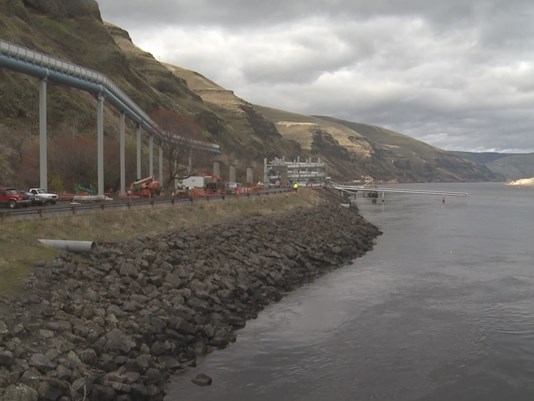forum
library
tutorial
contact

Why I Testified:
H.R. 3144 'Just Makes Sense'
by Beth Looney
Capital Press, November 15, 2017
|
the film forum library tutorial contact |

|
Why I Testified:
by Beth Looney
|
Already, fish and wildlife costs make up about a third of BPA's total cost of power.
In fiscal year 2016, that came to roughly $622 million.
 A few weeks ago, on a Thursday morning in our nation's capital, I took my seat in front of a microphone to face members of the U.S. House of Representatives Committee on Natural Resources' Subcommittee on Water, Power and Oceans.
A few weeks ago, on a Thursday morning in our nation's capital, I took my seat in front of a microphone to face members of the U.S. House of Representatives Committee on Natural Resources' Subcommittee on Water, Power and Oceans.
I had traveled from Portland to Washington, D.C., to make sure that the voices of my distribution cooperative members, and public power throughout the Northwest, were heard on a critical piece of federal legislation now before Congress.
The bill, H.R. 3144, places a temporary time-out on litigation brought by plaintiff groups with an agenda. It has bipartisan support from Northwest Reps. Cathy McMorris Rodgers, R-Wash.; Jaime Herrera Beutler; R-Wash.; Dan Newhouse, R-Wash.; Kurt Schrader, D-Ore.; and Greg Walden, R-Ore, notable in our polarized political times.
With the proposal gaining traction in Congress, anti-hydropower groups have been unfairly criticizing the legislation for taking the issue of how to balance hydropower and salmon protection "out of the judge's hands." I don't agree, and I urge you to consider this important bill in a more accurate light.
What it would do
Yes, the bill would hit the pause button on litigation -- but only until the same court's earlier order, to conduct a comprehensive NEPA review of all facets of the federal hydrosystem, is complete.
Moreover, the bill would not "overturn" any directive yet issued by U.S. District Judge Michael Simon. It only temporarily removes the matter from his courtroom, while federal agencies collect data and gather public input on the operations of the federal hydrosystem and its impacts on protected salmon -- information that the Judge himself has asked for.
Meanwhile, current biological measures vetted and supported by federal scientists in two consecutive administrations (the George W. Bush and Obama administrations) would remain in place to protect salmon in the Columbia and Snake rivers.
I went to D.C. to tell Congress that H.R. 3144 is a necessary interim solution that just makes sense -- for salmon, for families and businesses across the Northwest, and especially for PNGC's 200,000 member homes, farms and businesses, including many in rural, underserved communities.
Rising costs
Currently, 13 Columbia Basin salmon and steelhead species are listed under the Endangered Species Act. Driven by these listings, Bonneville Power Administration utility ratepayers fund the largest mitigation program for endangered species in the nation.
Already, these fish and wildlife costs make up about a third of BPA's total cost of power. In fiscal year 2016, that came to roughly $622 million. For just one year. Those steep costs aren't passed on to U.S. taxpayers, I reminded the subcommittee. Instead, they are paid by utility customers, including my customers, across the Northwest.
About 80 percent of PNGC's power supply comes from Bonneville. The rates we pay for BPA power are rising steadily and unsustainably, tied in large part to the constant litigation against the hydrosystem.
Now, yet again, due to ongoing lawsuits, Judge Simon is likely to order increased spill over the dams for the 2018 salmon migration season. This spill experiment could cost Bonneville customers another 2 percent rate increase, on top of a 5.4 percent increase that took effect several weeks ago and the 30 percent increase marched in over the past several years.
As I told members of Congress in Washington, D.C., PNGC values the clean, carbon-free, flexible hydropower that Bonneville provides. But I have a responsibility to supply power to my members at an affordable rate, whether that comes from Bonneville or elsewhere.
A time-out
My point to the subcommittee was this: If you care about the financial health and future of Bonneville and the important programs BPA supports, you must consider the impact of this rate trajectory on Northwest customers who have other, cheaper options for power. It's time for a temporary time-out.
In the meantime, there are strong existing protections in place for salmon. And, as soon as the National Environmental Policy Act review is complete, federal agencies will be positioned to adopt a new salmon plan based on the public, transparent NEPA process and the science it yields.
That's what this bill would allow and why I traveled across the country to endorse it on behalf of PNGC customers and Northwest RiverPartners. I hope you'll see reasons to support it, too.
Related Sites:
Testimony of Beth Looney President and Chief Executive Officer, PNGC Power
learn more on topics covered in the film
see the video
read the script
learn the songs
discussion forum
